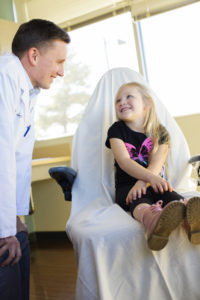
Young children may develop a childhood rash. It’s important to know what kinds of rashes during childhood are common and when you should see a board-certified dermatologist.
What are the most common types of childhood rash?
- Infectious Rash – Infectious rashes are the most common kind of childhood rash. They are usually the result of viruses, bacteria or fungus.
- Eczema occurs in about 10% of kids and often before the age of five. Eczema is triggered by extreme temperatures, sweating or dry skin.
- Hives, allergies to medications and psoriasis can also cause rashes.
When should you see a dermatologist?
You should seek attention from a dermatologist when your child’s rash starts to interfere with their daily routine. If a rash makes it difficult for a child to sleep or eat consult a dermatologist, or if a rash is interrupts playtime with friends or other interactions. Other reasons for seeing a dermatologist include the rapid spreading of the rash across the body or blistering near the mouth or hands. If the rash is causing headaches, painful bowel movements or abnormal behavior from your child consider making an appointment.
How is a childhood rash treated?
Treatments for rashes vary based on the type of rash your child is experiencing. The solution might be as simple as close observation. Depending on the severity of the rash treatment may include lotions, creams or even antibiotics. Certain rashes may even require laser or light treatment. The good news is that most therapies will take care of the rash quickly. Itchiness or redness is usually eliminated within a matter of days.
What about diaper rash?
Newborn babies are vulnerable to rashes. Diaper rash is the most common form of rash in babies. Although most diaper rashes are treated with barrier creams in severe cases prescription treatments may be used.
Babies also get bacterial infections. These can easily occur in newborns due to bacteria in the birth canal that is passed along to a child during birth. Vaccinations may leave children with minor rashes after they are administered. Newborns may also develop rashes after any sort of viral exposure. Always see your doctor if a rash persists or concerns you.
When it comes to rashes it is always better to be cautious. If your child has a rash that does not seem to be improving see your doctor right away.